Plant and Planet-Centered Eating
Air Date: Week of November 18, 2022
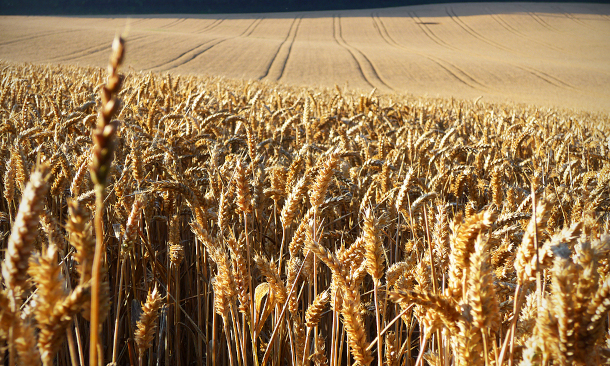
Amber waves of grain (Photo: Andrew Gustar, Flickr, CC BY-ND 2.0)
Our global food system feeds environmental crises like global warming and water pollution even as it fails to adequately feed billions of people worldwide. So in the 50th anniversary edition of “Diet for a Small Planet,” author Frances Moore Lappé renews her calls for a plant- and planet-centered food revolution. As Americans gather to give thanks over a feast, Ms. Lappé joins Host Steve Curwood to discuss how embracing the plant world in our diets connects to climate, health, and democracy.
Transcript
BASCOMB: From PRX and the Jennifer and Ted Stanley studios at the University of Massachusetts, Boston. This is Living on Earth, I’m Bobby Bascomb.
CURWOOD: And I’m Steve Curwood.
When American families gather to give thanks, many of the foods on our tables don’t express gratitude to the Earth, as much of our present food system is polluting and wasteful. For starters about a third is thrown away, tossed from kitchens and plates in rich places and spoiled where people can’t afford to refrigerate. And many industrial growing systems pollute and waste as well, using too much water, land and chemicals in ways that also add to climate disaster. Yet around the world more than 2 billion people are food insecure. Fifty years ago Frances Moore Lappé wrote the bestselling “Diet for a Small Planet” in a bid to address the hunger crisis, and along the way she seeded a plant-centered food revolution in the kitchens of America. Now there’s an anniversary edition of her book in which Frances Moore Lappé writes how pathways to sustainable food and democracy also lead to a healthier planet. She joins me now from Belmont, Massachusetts. Welcome back to Living on Earth, Frankie!
MOORE: Thank you so much, Steve, delighted.
CURWOOD: Frankie, just to be clear, what is a plant centered diet?
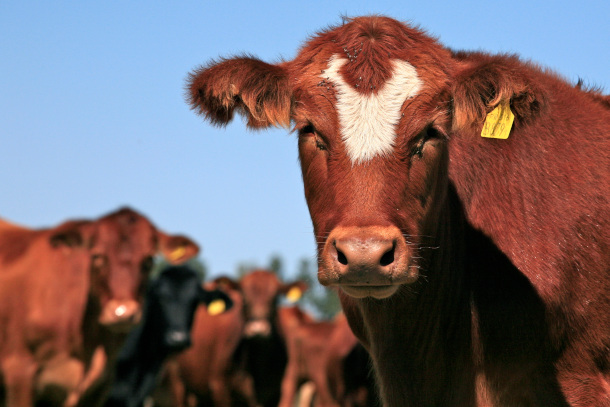
According to the UN's Food and Agricultural Organization, the meat and dairy industry contributes to about 14.5% of global greenhouse gas emissions. (Photo: Alex Promios, Flickr, CC BY NC 2.0)
MOORE: Well, it's embracing the plant world. When I moved from meat, you know I grew up in Texas cow town, right. So people said oh you're giving up so much and I said, no, no, no, it's the plant world that has all the taste differences, the color, the shapes, the textures, you know, it's where all the yummy stuff is. And so for me being plant centered is I don't follow recipes a lot but going into the kitchen and looking, you know, seeing what's there and finding out spices and herbs I love and for example, I turned a basic beans and rice dish into an Italian dish by just changing the herbs that are used in it. It's called Roman Rice and Beans in Diet for a Small Planet.
CURWOOD: So what you add a bit of oregano, and some thyme to make a more of an italiano type of rice and beans, huh?
MOORE: Yeah, probably there's basil in there, too. But you got the idea? Yeah.
CURWOOD: Okay, some basil, all right. So what's changed in the last 50 years since you wrote Diet for a Small Planet?
MOORE: Well, one thing for sure that what I thought was a good choice of way back when is now an absolute necessity to save life on our planet. So, yeah, that's a huge change. And I'd like to say that we're sort of moving in two directions at once because we've got it now we know what to do and all over the world, people are aligning with nature to grow our food but still the dominant extractive approach that is so dangerous and so unnecessary is still going strong. So we really are moving in two directions at once.
CURWOOD: So Frankie, what's the climate cost of the way we produce and consume food today?
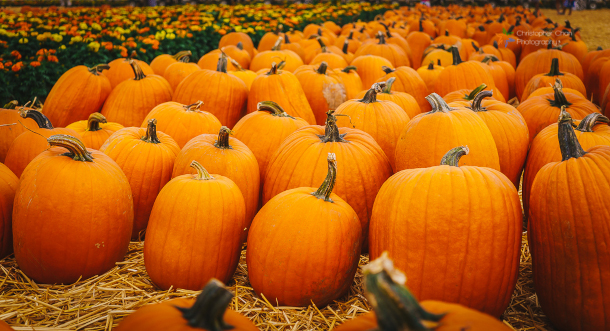
Francis Moore Lappé has been a longtime advocate for helping communities regain democratic control over the food system, enabling its sustainable transformation. (Photo: Christopher Chan, Flickr, CC BY-NC-ND 2.0)
MOORE: Well, our food system globally contributes about 37% of greenhouse gas emissions and about 40% of that is from the livestock sector. So that's a huge contribution. And now I'm calling it a plant and planet centered diet because if we really addressed this crisis and grew a healthy plant centered diet, that would cut the agricultural greenhouse gas emissions by about two thirds. A professor at the University of Minnesota calculated that it would be the equivalent to removing basically all the vehicles off the planet.
CURWOOD: Now, people listening to us need to be reassured that you're, you're not saying you can never eat meat, you're just telling us that make it a rare occasion.
MOORE: Yes, and to recognize especially in this country because we are one of the largest meat consumers, so what we do makes a huge difference. I mean, that's one thing about being especially on the wrong path, it means that if we turn that has an outsized impact for the good. So I call myself plant centered eating and I haven't eaten a hamburger since 50 years ago but I'm not I'm not a vegan. On a daily basis I don't eat a lot of dairy but Steve, I have to admit the half and half in my coffee. [LAUGH] You know, I really want to be big tent and to welcome people if they are eager to align with their body because there's a lot of evidence that this plant centered stuff is really good for us and with the earth thriving. So I think any step we can take I celebrate.
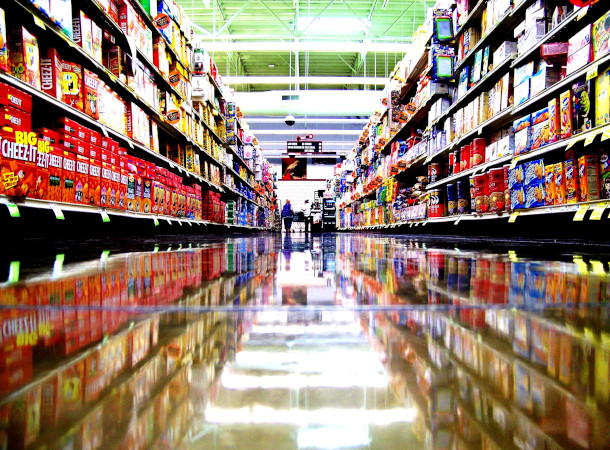
According to reports by the Institute for Health Metrics and Evaluation a poor diet with heavy red meat intake and sugary beverages is one of the greatest contributors to early death worldwide. (Photo: 1flatworld, Flickr, CC BY-NC-ND 2.0)
CURWOOD: Now, the meat production industry has gone to great lengths to concentrate operations. They say it cuts costs and improves efficiency but I think from purely a biological standpoint, no matter how efficient the meat industry might say that it has become, it could never be plant based diets in terms of the resources required to produce the calories and nutrients that people need. Why is that? And how do they compare?
MOORE: This is what woke me up at age 26, that I saw meat production as a protein factory in reverse. Consider this, we use about 80% of our agricultural land to produce livestock but they get to us only 18% of our calories. So right there that is pretty darn inefficient and for beef, one estimate says that of the grains fed to livestock we get about 3 to 5% of the calories and protein that we eat from all of that grain that gets fed to livestock in this country. So it's really hard to imagine anything less efficient. That is for beef, everything gets a little more efficient as you go and especially poultry are significantly more efficient. So beef is the worst and unfortunately we still eat a lot of beef. And I also want to add here, that it's not only the environmental costs, but definitely the human health costs.
CURWOOD: Well, tell me a little bit more about the the health risk of red meat.
MOORE: Well, I was actually shocked to learn recently that the WHO, the World Health Organization has deemed red meat a probable carcinogen. And when I looked into it a bit that has to do with heme iron in red meat and that could be a facilitator in some way of a process of disease and that high temp cooking, high temperature cooking could be a factor in making it not good for us. That is a red flag for me that the WHO has given us and then on processed meat the WHO has deemed processed meat a carcinogen. So that would include salami and hotdogs and all of those, and we eat a lot of it, about 20% of our meat is in that processed form. They add that it's on the level of tobacco, alcohol, that sort of thing. So it's not a small concern.
CURWOOD: Oh, boy. So food is clearly linked to ecological health and our own, of course. But why do you think that the food we eat is also linked to the health of our democracy in your view?
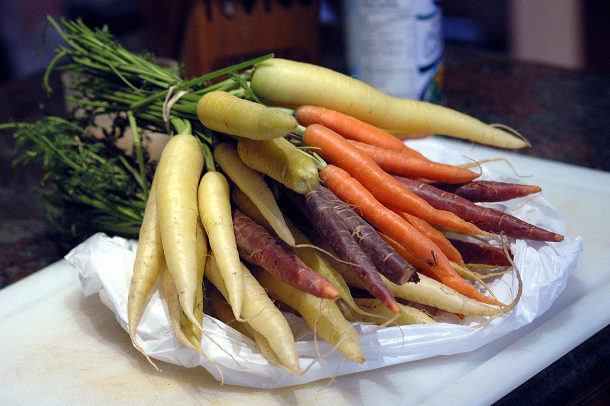
According to the nonprofit organization ReFed, food waste has a footprint equivalent to 4% of total US greenhouse gas emissions. (Photo: Carribb, Flickr, CC BY-NC-ND 2.0)
MOORE: Well, everything is linked with the health of our democracy, Steve. You know I think of our democracy as the taproot crisis and we also have a living planet crisis and we also have an economic crisis too, of concentration of wealth, but the taproot is democracy, because that is the way that we make decisions together to solve problems. So if we're going to solve the problem of hunger, amid plenty of our diet being so hazardous to our health, which is so ironic and sad, if we're going to solve these huge problems of our environment, and the impact of farming on climate change, which is quite significant, we have to have democracy. And what we have now I think of as a very corrupted form because private interests those who are benefiting very much from fossil fuels and from the meat production industry and all that we have in place now, they have tremendous power in Washington. There are now 20 corporate lobbyists in Washington for every single person that you and I elect to represent us in Washington. That is problematic, that is what I call a corrupted system and that's why I think it's so important Steve, we've got to solve these problems and we've got to have democracy to solve them.
CURWOOD: Frankie, you write about a worldwide revolution in agro ecology, that Jules Pretty at the University of Essex in the UK and colleagues have documented. What's the significance of this bottom up revolution in how people are growing food? And what do you think that might mean for democracy?
MOORE: Well, I think it is a form of what I call living democracy because it's an everyday practice of working together, making decisions together on the land, what we grow, how we grow it. And one of the most exciting things in writing the 50th anniversary opening chapter was really being in touch with Dr. Pretty who you mentioned because he's devoted his life to tracking the emergence of such forms of self governance on the land, growing food healthfully, and he was able to track from the year 2000 to 2020, this enormous change. When we started in 2000, there were about half a million of such groups around the world and during those 20 years, 8 million more such groups, he was able to identify.
CURWOOD: The fault lines in our democracy and the problems with our food systems seem bigger than ever these days. Yet in order to fix them, people have to believe that things can change that in fact, we can make a difference. So what's your advice for practicing hope without well, you know, singing the songs of Pollyanna?

Frances Moore Lappé is author of Diet for a Small Planet. She founded The Small Planet Institute, which focuses on social solutions to the environment, hunger and politics through living democracy. (Photo: Michael Piazza)
MOORE: Well, I have decided that I am not an optimist Steve, because I think optimism means that you have some certainty of outcome. And I think a lot of human beings we don't need certainty of outcome. All we need is the sense that it is possible that our actions can matter and we humans will jump inn because we want to matter that's part of our essence, we want to count. And that's why I think starting with food is so beautiful because every day we make choices of what we put into our mouth. That connects us to the people who grow the food are they being poisoned by pesticides? Well if we're eating their food that keeps that going on and on to the climate impact and so I really think that this theme of optimism is not the way to go. I call myself a possibleist not an optimist because I believe that there is still a chance that our actions can make a huge difference in turning our planet toward life.
CURWOOD: Francis Moore Lappé is a co-founder of the Small Planet Institute and has authored 20 books including Diet for a Small Planet. Thanks so much for taking the time with us today Frankie.
MOORE: Thank you so much, Steve what a pleasure.
Links
The New York Times “The Godmother of Plant Based Living”
Living on Earth wants to hear from you!
Living on Earth
62 Calef Highway, Suite 212
Lee, NH 03861
Telephone: 617-287-4121
E-mail: comments@loe.org
Newsletter [Click here]
Donate to Living on Earth!
Living on Earth is an independent media program and relies entirely on contributions from listeners and institutions supporting public service. Please donate now to preserve an independent environmental voice.
NewsletterLiving on Earth offers a weekly delivery of the show's rundown to your mailbox. Sign up for our newsletter today!
 Sailors For The Sea: Be the change you want to sea.
Sailors For The Sea: Be the change you want to sea.
 The Grantham Foundation for the Protection of the Environment: Committed to protecting and improving the health of the global environment.
The Grantham Foundation for the Protection of the Environment: Committed to protecting and improving the health of the global environment.
 Contribute to Living on Earth and receive, as our gift to you, an archival print of one of Mark Seth Lender's extraordinary wildlife photographs. Follow the link to see Mark's current collection of photographs.
Contribute to Living on Earth and receive, as our gift to you, an archival print of one of Mark Seth Lender's extraordinary wildlife photographs. Follow the link to see Mark's current collection of photographs.
 Buy a signed copy of Mark Seth Lender's book Smeagull the Seagull & support Living on Earth
Buy a signed copy of Mark Seth Lender's book Smeagull the Seagull & support Living on Earth

